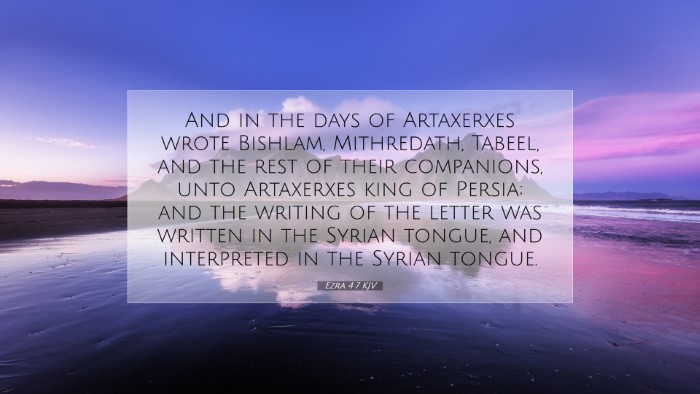Old Testament
Genesis Exodus Leviticus Numbers Deuteronomy Joshua Judges Ruth 1 Samuel 2 Samuel 1 Kings 2 Kings 1 Chronicles 2 Chronicles Ezra Nehemiah Esther Job Psalms Proverbs Ecclesiastes Song of Solomon Isaiah Jeremiah Lamentations Ezekiel Daniel Hosea Joel Amos Obadiah Jonah Micah Nahum Habakkuk Zephaniah Haggai Zechariah MalachiEzra 4:7
Ezra 4:7 KJV
And in the days of Artaxerxes wrote Bishlam, Mithredath, Tabeel, and the rest of their companions, unto Artaxerxes king of Persia; and the writing of the letter was written in the Syrian tongue, and interpreted in the Syrian tongue.
Ezra 4:7 Bible Commentary
Commentary on Ezra 4:7
Ezra 4:7 states:
"And in the days of Artaxerxes wrote Bishlam, Mithredath, Tabeel, and the rest of their companions unto Artaxerxes king of Persia; and the writing of the letter was written in the Syrian tongue, and interpreted in the Syrian tongue."
Contextual Background
The book of Ezra is a pivotal narrative in the post-exilic history of Israel, recounting the return of the Jewish exiles from Babylon and the rebuilding of the temple in Jerusalem. Ezra 4 chronicles the opposition faced by the Jews from adversaries who sought to thwart their efforts to restore their covenant community. The timing of this verse, situated during the reign of King Artaxerxes, highlights the political and social complexities of the period.
Commentary Insights
Political Intrigue and Opposition
In her analysis, Matthew Henry presents this verse as a critical moment showcasing the attempts by various leaders to undermine the efforts of the returning exiles. Artaxerxes, a significant figure in the Persian Empire, is approached with a letter that, though couched in political language, reveals an underlying motivation of fear and jealousy among the Samaritans and other groups threatened by the Jews’ restoration.
- Political Tension: Henry notes that political tensions are evident as these adversaries frame their communication to Artaxerxes with the intent to sow discord. They perceive the rebuilding of Jerusalem as a threat to their own authority and security.
- Use of Language: The use of the "Syrian tongue" signifies a bridge between cultures, yet also an exclusion. It emphasizes the need for precise and deliberate communication in political matters, reflecting the strategic approach of the adversaries.
The Role of Correspondence
Albert Barnes emphasizes the significance of written correspondence in ancient governance, highlighting that letters were a means not only of communication but also of manipulation. Barnes notes that the letter's intention is to persuade the king against the Jews by painting them in a negative light, suggesting that their ambitions could endanger the stability of the province.
- Artaxerxes' Responsibility: There is an implied call for accountability placed on Artaxerxes as the leader whose decisions impact the fate of the exiled community.
- Interpretation of the Letter: The translation of the letter into the "Syrian tongue" points to the logistical and diplomatic challenges of governing a diverse population. This factor underlines the importance of understanding and interpreting communications appropriately in the context of rule.
Spiritual Underpinnings and Divine Sovereignty
Adam Clarke's commentary sheds light on the underlying spiritual dimensions of this moment. He articulates that, despite the machinations of earthly power, God's providential hand is at work throughout history. Clarke implies that the opposition faced by the Jews serves as a reminder of their need to depend on divine deliverance amidst human opposition.
- Perseverance of the Jewish People: Clarke notes the resilience of the Jewish people in response to such challenges, which can be seen as an expression of their faith and commitment to God's promises.
- The Bigger Picture: The opposition and the political maneuvering serve as a backdrop for the unfolding of God's plan for His people, suggesting that struggles often precede restoration and renewal.
Theological Implications
The events depicted in Ezra 4:7 provide rich theological insight into the nature of God’s guidance and protection of His people amidst trials. The adversaries' actions reflect the ongoing struggle believers face against forces that seek to undermine their faith and mission. This text reminds us of the importance of vigilance in prayer and reliance on God's wisdom when faced with opposition.
Lessons for Today's Believers
- Awareness of Opposition: Just as the Jews experienced opposition, modern-day believers are reminded to be aware of ideological and spiritual challenges that seek to impede their mission.
- Communication and Diplomacy: The careful approach to communication shown in Ezra 4:7 teaches the contemporary church the significance of wisdom in addressing challenges and engaging with authorities.
- Trust in God's Sovereignty: Ultimately, believers are called to trust in God’s sovereignty. Just as He guided His people through trials in ancient times, He continues to guide and protect His church today.
Conclusion
Ezra 4:7 stands as a critical juncture in the historical and spiritual narrative of Israel's return from exile. The insights gathered from commentaries reveal not only the political maneuverings of the day but also an enduring theology of faithfulness amidst trial. For pastors, scholars, and theologians, this verse, and the ensuing commentary, serves as a profound reminder of God’s overarching sovereignty in the tapestry of human history, encouraging believers to remain steadfast in their faith amidst opposition.


